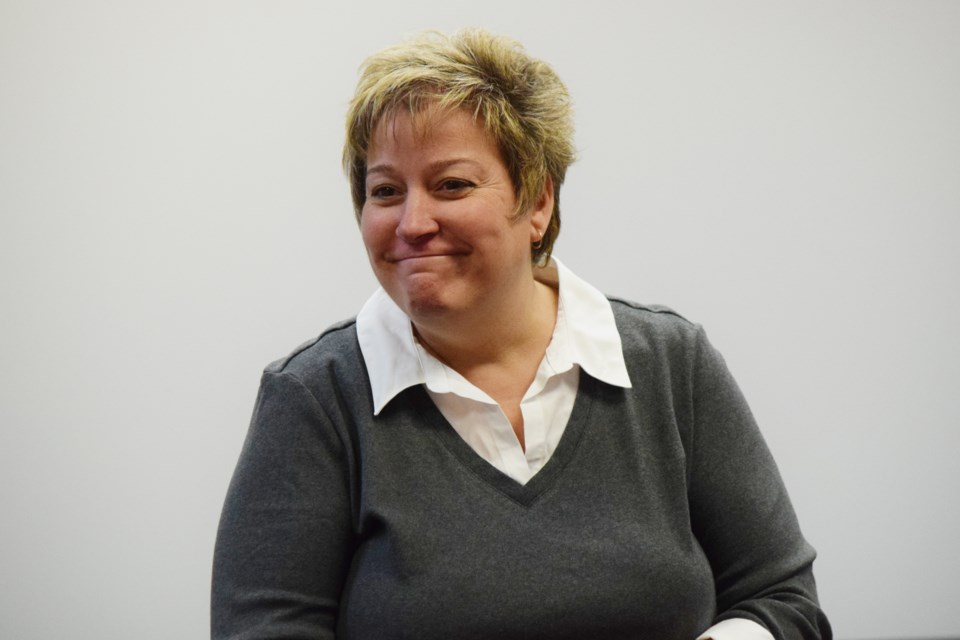BARRHEAD - In bad economic times, one of the places people turn to for help is Barrhead’s Family and Community Support Services (FCSS).
Unfortunately, FCSS executive director Shelly Dewsnap said they find themselves in a position where they have to turn clients away.
Not because they don’t want to help, but because they don’t have the resources to help due to budget constraints.
And she fears that they will have to turn away an increasing number of people in the future.
That is what Dewsnap, along with FCSS board members Randy Hindy and Jane Wakeford, told Barrhead municipal councillors Dec. 9 during the Town of Barrhead and County of Barrhead joint meeting.
It is also why FCSS is asking councillors to approve an additional $15,000 each on top of their regular $61,000 contributions.
Later in the meeting, councillors voted unanimously to take the FCSS budget to their respective councils for consideration.
Although the Barrhead and District FCSS is a stand-alone, not-for-profit organization, it receives the bulk of its funding from provincial and municipal grants. In 2020, the provincial grant will be $315,423.
In 2020, FCSS projects it will basically break even, projecting $504,038 in revenue and $504,037 in expenses.
However, that was done at the expense of scaling back, capping or eliminating programs, Dewsnap said.
“For 2020, we have a 12 per cent loss in revenue. If you work with budgets, you know that is huge. That amounts to $48,000 on the FCSS side,” she said.
One of the initiatives slated to end because of the funding shortfall is the Family School Liason (FSL) program. The program is a partnership with Pembina Hills School Division (PHSD) and Woodlands County. An FSL worker’s role is to help students in distress find the right supports to meet their daily needs.
On average, the program serves 104 students a month in six PHSD schools in the region.
“We are operating with one FSL worker because all three partners could not make the rehire of a second person happen,” Dewsnap said. “And the entire program, our second largest is slated to end [at the end of the school year] in 2020.”
FCSS is also looking to cap and reduce the number of clients it serves with its senior’s programs. More specifically in its home support program, which helps seniors stay in their homes longer by providing light housekeeping services.
It should be noted that clients have to pay for the service, but at a highly subsidized rate.
Dewsnap said FCSS’ popular youth programming is also in danger of being curtailed.
For the last two years, FCSS increased its youth programming to include a two-day a week after school program. They have also partnered with Barrhead CARES to put on special events, such as the sleepover leadership event at Camp Nakuman.
Barrhead Cares is a coalition of community members who banded together in 2003, initially as the Barrhead and District Drug Coalition, to combat the problems associated with the effects of alcohol and drug use in the community. In 2012, the group changed its name to Barrhead Cares to reflect its growing mandate.
FCSS also organizes monthly youth events in Fort Assiniboine.
Youth programming in Fort Assiniboine is slated to end in February as Woodlands County has not confirmed funding.
Dewsnap also suspects they will have to reduce Barrhead’s youth programming as well.
“We operate the program using our casino funds for as long as we can and then access FCSS dollars,” she said. “We are already on those FCSS dollars.”
Why funding is down
Dewsnap noted one of the reasons why their revenue is down is because many of their programming partners have had their budgets slashed, whether it is the Pembina Hills School Division or Woodlands County.
But perhaps the biggest reason is the province’s announcement in November that it will be cancelling the contracts and grants with 300 organizations that operate Parent Link Centres and similar programs. Parent Link Centres provide free programming and resources for families with young children (infants to six-years-old) as well as Early Childhood Development (EDC) funding.
The government plans to replace them with Family Resource Networks by March 2020.
Lauren Armstrong, press secretary to Children’s Services Minister Rebecca Schulz, said the current parent link system is a patchwork of services across the province.
The new approach aims to create a more standardized system, she said, noting that the current programming stops at age six in some areas.
The government estimates the change will save $12 million a year.
Dewsnap said details about the new networks are still being released but from her understanding, they will have a much larger scope, possibly including children up to 18.
“[The networks] will be asked to deliver more service to a larger population with fewer dollars,” she said.
Although Parent Link is a separate program from FCSS, it shares the building and helps subsidize the building’s lease.
“All the rent that would have been charged is transferred to FCSS,” she said.
Dewsnap said that as a result of Parent Link being shut down, FCSS will also lose revenue it received from the centre for administration.
“It changes the whole picture for FCSS,” she said.
“The materials we would have shared [with Parent Link] and would have been split between a dozen programs are now going to split between 10.”
Due to the loss of Parent Link, FCSS will operate four days a week (closing on Fridays) starting in April. They will also put a cap on referral counselling hours.
Where the extra money will go
Dewsnap said if the municipalities agree to the extra funding, it would be allocated to help the FSL program continue and to enable FCSS to remain open on Fridays.



